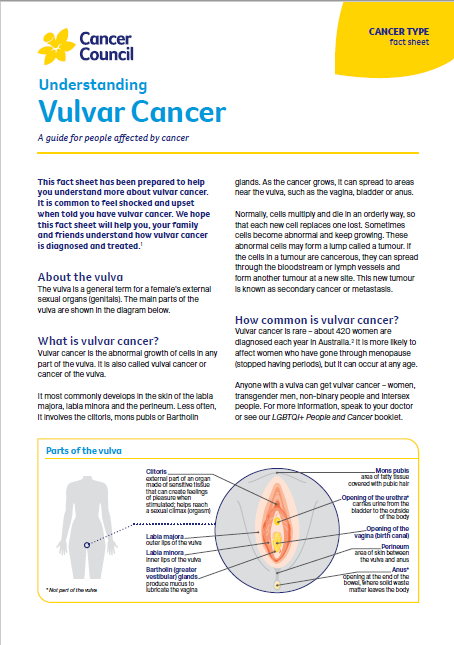- Home
- Vulvar cancer
- Managing side effects
Managing side effects for vulvar cancer
All treatments for vulvar cancer can have side effects. Some side effects go away quickly; others can take weeks, months or even years to improve. Your treatment team will discuss the likely side effects with you before treatment starts.
Vulvar cancer and its treatment can sometime lead to long-term, life-changing side effects, such as changes to how the vulva and vagina look and feel, bladder changes, lymphoedema and impact on sexuality.
Learn more about:
- Common treatment side effects
- Coping with your emotions
- Changes to the vulva and vagina
- Bladder changes
- Lymphoedema
- Impact on sexuality
Common treatment side effects
Let your treatment team know about any symptoms or side effects you have. They may be able to suggest ways to reduce or manage any discomfort.
| surgery | fatigue; change in how the genitals look; scar tissue; difficulty urinating; lymphoedema (if lymph nodes removed); pain; sexual problems; trouble controlling the flow of urine (urinary incontinence); bowel changes |
| radiation therapy | fatigue; skin reactions (dry, itchy and tender skin, peeling skin); sore and swollen vulva; changes to the vagina (dryness, shortening, narrowing); vaginal discharge; loss of pubic hair; bladder and bowel changes; urinary incontinence; lymphoedema; sexual problems; menopause (when periods stop) |
| chemotherapy | fatigue; nausea; increased risk of infection |
Coping with your emotions
How you might feelIt is common to feel shocked and upset about having cancer in one of the most intimate and private areas of your body. You may feel a wide variety of emotions after the diagnosis and during treatment, including anger, fear, anxiety, sadness and resentment. | |
Adjusting to changes to your bodyHaving parts of your vulva, including the clitoris, removed can affect your self-image. If you decide to look at your vulva, it is natural to be shocked by any changes. You may find that your sense of femininity or identity has been affected. Try to see yourself as a whole person (body, mind and personality), instead of focusing on the changes. | |
Talk to someoneIt is important to give yourself and those around you time to deal with the emotions that a diagnosis of vulvar cancer can cause. It can help to share how you’re feeling about treatment side effects with a counsellor or psychologist. Ask your doctor for a referral. For support, you can also call Cancer Council 13 11 20. |
For more on this, see Emotions and cancer.
→ READ MORE: Changes to the vulva and vagina
Podcast: Managing Cancer Fatigue
Listen to more of our podcast for people affected by cancer
More resources
Prof Alison Brand AM, Director, Gynaecological Oncology, Westmead Hospital, NSW; Kim Hobbs, Clinical Specialist Social Worker, Gynaecological Cancer, Westmead Hospital, NSW; Dr Ming-Yin Lin, Radiation Oncologist, Peter MacCallum Cancer Centre, VIC; Dr Lisa Mackenzie, Clinical Psychologist Registrar, HNE Centre for Gynaecological Cancer, Hunter New England Local Health District, NSW; Anne Mellon, CNC – Gynaecological Oncology, HNE Centre for Gynaecological Cancer, Hunter New England Local Health District, NSW; A/Prof Tarek Meniawy, Medical Oncologist, Sir Charles Gairdner Hospital and The University of Western Australia, WA; Dr Archana Rao, Gynaecological Oncologist, Senior Staff Specialist, Royal Brisbane and Women’s Hospital, QLD; Tara Redemski, Senior Physiotherapist – Cancer and Blood Disorders, Gold Coast University Hospital, QLD; Anita Tyrrell, Consumer; Maria Veale, 13 11 20 Consultant, Cancer Council QLD.
View the Cancer Council NSW editorial policy.
View all publications or call 13 11 20 for free printed copies.
Need to talk?
Support services
Life after cancer treatment
Webinars, exercise and nutrition, sexuality programs, and back-to-work support
Need legal and financial assistance?
Pro bono services, financial and legal assistance, and no interest loans
Cancer information
Sexuality, intimacy and cancer
Ways to adapt when cancer treatment affects your sexuality
Exercise and cancer
Exercise information and videos to help you manage the impact of cancer

